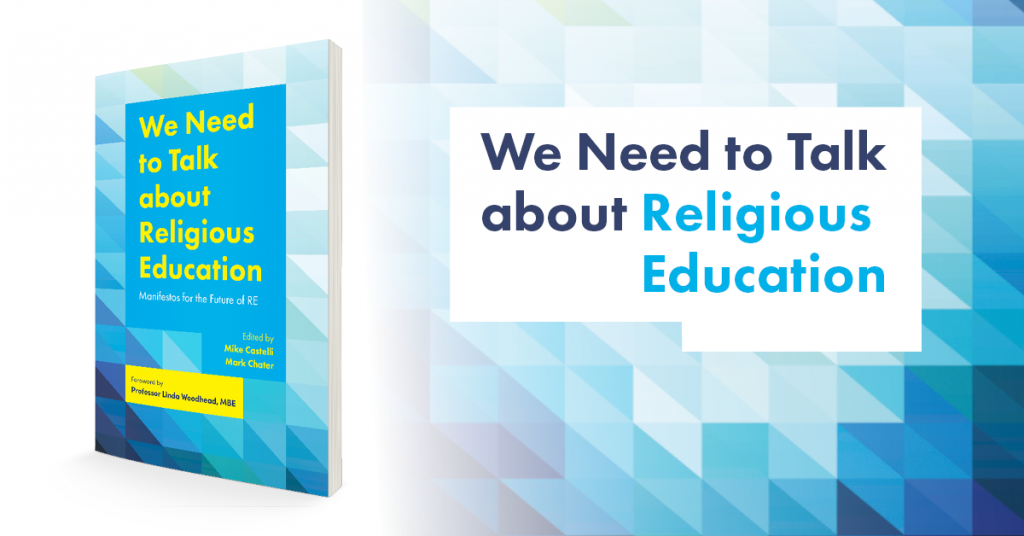Although Religious Education (RE) is a legal requirement in UK schools, it is an oft-neglected and misunderstood subject. It is important to seriously re-think this key subject at this time of low religious literacy and rising extremism, to protect communities from the consequences of hatred and misunderstanding.
We spoke to Mark Chater about his new book (co-edited with Mike Castelli) that brings together essays from prominent thought leaders in the theory and practice of RE, to promote wider discussion of what exactly is needed from a new model of RE within our education system to benefit wider society.
What were your motivations for writing We Need To Talk About Religious Education?
A creative anger that the voices of very able younger teachers are not being properly heard, that they deserve to become thought leaders for RE; also, an interest in listening to voices of experience and wisdom who can see change coming and welcome it; a desire to pump some life-giving fresh air into the old body of RE, to save it; and a professional and personal commitment to promoting the change debate in RE.
The book collates essays from a range of thought leaders in the theory and practice of RE. How did you go about choosing who to involve with the project?
The editors worked with a very wide range of people, known to us and new to us. We wanted a lively diversity of views and belief backgrounds. We explained in our introduction that the book’s title is deliberately pluralistic, indicating not only the authors’ desire to discuss and develop their ideas in dialogue with the readers, but also a perception that the wider public – parents, teachers, school leaders, academics, faith leaders, other community stakeholders – need to discuss RE and find a new, assured place for it, based on a shared understanding of the common good.
Who is this book written for?
It’s a very open book, I hope; any teacher, trainer, parent, researcher, adviser or civil servant could read it in a couple of days. Particularly for those professionally involved in the sharp end of RE, as teachers or trainers, advisers or consultants, this book offers a range of exciting visions of RE. It bridges research-practice, policy-practice and confessional-non-confessional divides.
What would you say to someone who rejects the idea that RE is an important part of the school syllabus?
I would say: look around you. Notice how much religions and worldviews count in current affairs, whether you like it or not. Observe how much religion and culture are interwoven with each other and how much they matter in the lives of young people. Then look at yourself and ask: do I have the right to deny young people any opportunity to become better informed about all that? Of course you don’t. I would say get over yourself, get over your personal beliefs, and think about what it is that young people need to learn in our society.
The book covers contemporary issues, such as the rise of extremism, hate speech and teaching as a digital profession. How important was it to you to tackle these urgent topics?
This is complicated. The rise of extremisms in many religious and secular communities is a global phenomenon. We have to protect ourselves and our communities on many fronts, and one of them is the battle of ideas. Many of the authors in our book are saying: RE has something vital to contribute to this battle of ideas, because we promote clear knowledge, understanding, religious literacy, the ability to tell sound arguments from false ones; but that is not the whole of what RE does. We are not here solely to promote tolerance and respect. There is much, much more to our subject.
And what about the pupils? What has been your experience when speaking to pupils about the role of RE?
Pupil voice comes out clearly in the chapters by Mary Myatt and Adam Whitlock. In a more general sense, all of the authors are informed by the professional work they have done with pupils. I think it shows in the very grounded way they have written.
If readers were to take away one key learning from the book, what would you hope it would be?
If I’m only allowed one, it would be: this book offers you a taster of the enormous reserves of intellectual liveliness, professional commitment, and desire for change and improvement in the RE community. The authors may have different views, but I believe they all know that RE cannot stand still, and they look to our school leaders and politicians to unlock RE and set it free for excellence.
For more information or to buy a copy of the book, follow this link.
Why not follow us on Facebook @JKPReligion or Twitter @JKPBooks for more exclusive content from our authors.

As a former RE teacher , found this article to be very timely. However, there is a mountain of misunderstanding to be climbed.